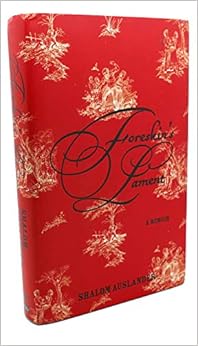
Description
From Publishers Weekly Auslander, a magazine writer, describes his Orthodox Jewish upbringing as theological abuse in this sardonic, twitchy memoir that waits for the other shoe to drop from on high. The title refers to his agitation over whether to circumcise his soon to be born son, yet another Jewish ritual stirring confusion and fear in his soul. Flitting haphazardly between expectant-father neuroses in Woodstock, N.Y., and childhood neuroses in Monsey, N.Y., Auslander labors mightily to channel Philip Roth with cutting, comically anxious spiels lamenting his claustrophobic house, off-kilter family and the temptations of all things nonkosher, from shiksas to Slim Jims. The irony of his name, Shalom (Hebrew for peace), isn't lost on him, a tormented soul gripped with dread, fending off an alcoholic, abusive father while imagining his heavenly one as a menacing, mocking, inescapable presence. Fond of tormenting himself with worst-case scenarios, he concludes, That would be so God. Like Roth's Portnoy, he commits minor acts of rebellion and awaits his punishment with youthful literal-mindedness. But this memoir is too wonky to engage the reader's sympathy or cut free Auslander's persona from the swath of stereotype—and he can't sublimate his rage into the cultural mischief that brightens Roth's oeuvre. That said, a surprisingly poignant ending awaits readers. (Oct.) Copyright © Reed Business Information, a division of Reed Elsevier Inc. All rights reserved. From Bookmarks Magazine Shalom Auslander, author of Beware of God: Stories (2005) and a contributor to This American Life , reveals his ambivalence about God through fear, black humor, and undirected anger. If Foreskinâx80x99s Lament sounds like a terrible rage against God, it is, in parts, but it coalesces into a fascinating reflection on the role of faith and ritual in modern life. Most reviewers found Auslanderâx80x99s stories about his tormented life refreshing, moving, and humorousâx80"for example, the story of his father building an ark for the synagogue, only to be ostracized, struck a high note. However, a few criticized Auslanderâx80x99s tendency to mask real anger and deep questions with comedy. Beneath the humor, however, lies a reflective memoir on religionâx80x99s powerful holdâx80"and why, sometimes, itâx80x99s so hard to shake it off. Copyright © 2004 Phillips & Nelson Media, Inc. Shalom Auslander writes like Philip Roth's angry nephew. Foreskin's Lament is a scathing theological rant, a funny, oddly moving coming-of-age memoir, and an irreverent meditation on family, marriage, and cultural identity. God may be a bit irritated by this book, but I loved it. -- Tom Perrotta, author of Little Children and The Abstinence Teacher Shalom Auslander ���was raised in Monsey, New York. Nominated for the Koret Award for writers under thirty-five, he has published articles in��� Esquire ,��� The New York Times Magazine ,��� Tablet ,��� The New Yorker , and has had stories aired on NPR's��� This American Life . Auslander is the author of the novel Hope: A Tragedy , the short story collection��� Beware of God ,���and the memoir��� Foreskin's Lament . He lives in New York. To learn more about Shalom Auslander, please visit www.shalomauslander.com. Read more
Features & Highlights
- An intimate account of the author's youth in a strict Orthodox community describes his dysfunctional family's vengeful personification of God, his exile to reform school after a childhood misdemeanor, and his efforts to make sense of his religious beliefs while connecting with the outside world. 30,000 first printing.





